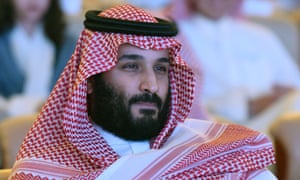Guardian Editorial

Link
The slow-motion coup in Saudi Arabia is changing nothing – and everything – in the desert kingdom. An unprecedented series of arrests this weekend has put princes, former ministers and tycoons behind the gilded bars of a five star hotel. By precipitating the resignation of the Lebanese prime minister, a new front against long-time rival Iran was opened up just as an old one became inflamed by rocket fire. Yet the ruler of the repressive desert state remains the aged and ailing King Salman. His legitimacy derives from his lineage: he is a son of the nation’s founder, and traditionally the post of king passes from brother to brother in order of age. In an absolute monarchy, the king’s word is final. Yet it is by deed that power is known. By that measure, there’s only one person running Saudi Arabia: crown prince Mohammed bin Salman. If he ascends to the throne, the 33-year-old will have broken the grip of the older Sauds over the state the family’s patriarch founded.
The crown prince, known as MbS, is a young, inexperienced, and belligerent man. His misguided foreign policy, which has backfired spectacularly in Yemen, Syria and Qatar, is testament to hasty and rash decision-making. He now seeks to disturb the delicate balance of forces in Lebanon. MbS’s enemies, as with Abu Dhabi’s Mohammed Bin Zayed, are the Muslim Brotherhood and Iran. His best friend internationally appears to be US president Donald Trump, who took time out of his tour of Asia to tweet approvingly of MbS’s actions and, in passing, lobby to secure a US listing of Saudi Arabia’s national oil company. But MbS has proved cunning and ruthless – moving to silence those who disagree with him in the clergy and in the sliver of space afforded to Saudi civil society. At the same time as depriving citizens of civil rights, MbS afforded female drivers the right to drive. The crown prince gives a little, but takes a lot.
The latest arrests appear transparently political. The crown prince has been put in charge of a new anti-corruption committee with powers to arrest and confiscate corruptly obtained property. The purge at the weekend implicated three of the country’s richest people. This looks like an attempt to defuse public disquiet over growing corruption after years when ordinary Saudis, under King Salman’s rule, had seen state handouts curbed. While benefits and bonuses were reinstated this year, the feeling that graft was so rampant that it threatened to overwhelm the nation has not gone away. Saudi Arabia, one of the world’s largest oil producers, is ranked last in the world for budget transparency. No one knows exactly how much money is spent by the state.
The inner circle of the royal family is accused of embezzling huge sums of public funds. The Salman branch of the house of Saud lives lavishly. While overseeing deep budget cuts, the king spent $100m on a holiday in Morocco and his son bought a $500m yacht. There are legitimate questions about whether you can sweep out the Augean stables if you don’t have clean hands. What the crown prince displays is a taste for autocratic means, free from the traditional collective decision-making of the Saudi elite. It would be better for the country to have a more responsive politics and a dynamic economy freed from its dependence on oil. But the crown prince has yet to show he is serious about acquiring these things rather than consolidating his rise to the top.

No comments:
Post a Comment